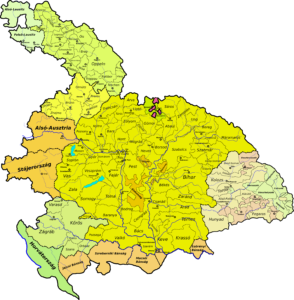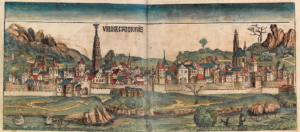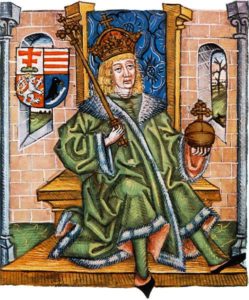6 April 1490 The death of King Matthias Corvinus
On 6 April 1490, King Matthias Corvinus of Hungary died in Vienna, having gained the titles of Duke of Austria and King of Bohemia in the course of building his empire. His reign was already a source of great controversy among his contemporaries. One of the rather critical opinions is that Matthias neglected the Turkish threat, and squandered the military power at his disposal and the economic power he had gathered through cruel taxation of the country on pointless campaigns of conquest in the West.

The other view, however, is that the king realized that Hungary alone was unable to resist the Turks, and therefore sought to create a larger state. According to this view, he recognized that development in East-Central Europe was moving towards federations of states in personal unions. The Habsburgs and the Hungarians were contesting to gain the upper hand in order to achieve this.
However, due to his sudden death, he was not able to implement his plans and create a strong and lasting state or empire, governed from his palace in Buda. As it turned out later, only the Habsburgs were able to build a similar state, but the center became Vienna and Prague which was not very good for the Hungarians. His death at the age of 47 changed everything.

The last years of his reign
In 1485, the king conquered one of the most important cities of the German-Roman Empire, and after conquering the Austrian provinces, he took the title of duke. Matthias’s empire was at its largest at the time of his death, so many believe that the early end dramatically cut the king’s rise to power in two. In reality, the final years of Matthias’ reign saw a marked decline, as the ruler failed to overcome the main obstacles.

Firstly, his second wife, Beatrix of Aragon, bore him no children, so Matthias had to face the bargain in the 1463 Treaty of Vienna that on his death his country would pass to the Habsburgs, the very dynasty whose imperial title and position in Central Europe he was seeking to conquer. Matthias had a natural son, János Corvin, born in 1473, whom he tried to get accepted as his heir, but the issue was never settled.

Matthias also suffered setbacks in his struggle for the imperial title, and in 1481 he conquered the Austrian and Styrian provinces, Vienna, and in 1487 Bécsújhely (Wiener Neustadt) from Frederick III (lived 1440-1493), he shared the throne of Bohemia with Ulászló, and with it the title of Elector, but in 1486 Frederick crowned his son, the future Emperor Michael I (r. 1493-1519), as King of Rome. The German noble estates did not support Matthias’ imperial ambitions either, because they found him too strong a candidate, and his centralized government and the strength of the Black Army did not win their approval.

As a result of this, the king was not successful in organizing a crusade against the Turks because he probably wanted to gain the title of emperor before it. In 1483, in the absence of sufficient opportunity and support, Matthias made a truce with the Ottoman Sultan Bayezid II (r. 1481-1512) for ten years. A few years later, however, a favorable opportunity presented itself, for Prince Djem, who had claimed the throne against his brother, fled to Western Europe. From then on, Matthias used all his efforts to win the prince, using him to provoke a civil war in the Turkish Empire, which would have been an excellent opportunity to liberate the Balkan Peninsula and Constantinople. But the king cajoled Venice and the Pope in vain, and could not match the Turkish ransom he had hoped for Djem. You can read my article about it here:
https://www.hungarianottomanwars.com/essays/was-king-matthias-related-to-sultan-mohamed-ii/

A side note about the Fugger bankers:
King Matthias` expansion to Austria may have helped Jakob Fugger to make a very good business in 1488 with Archduke Sigismund of Habsburg of Tirol who needed the money very badly; Fugger took hold of the income of the silver mines of Tirol in exchange for a loan to the needy monarch. These were the richest mines besides the Hungarian ones, ten thousand miners worked there.

As the army of King Matthias was threatening these mines, the Fuggers regarded Matthias as a threat and considered Hungary as a promising business in the future. Jakob Fugger was lucky because Matthias died and the Hungarian kingdom began its decline so he could become the biggest loan-giver of the Habsburgs in the years to come. Here is more about the source of gold and silver in the age of King Matthias:
https://www.hungarianottomanwars.com/essays/the-money-of-king-matthias/
A declining empire?
By 1489, it was clear that all of Matthias’ diplomatic and military endeavors had come to a standstill: from then on, he was only concerned with the succession of his son, whom he had bestowed with the largest castles in the country and numerous lands. The king was prepared to do almost anything to gain recognition for János Corvinus from his neighbors, especially the Habsburgs, and was ready to hand over all the conquered hereditary provinces to Maximilian as a guarantee. Matthias marched to Vienna in the spring of 1490, donating the keys to the most important castles to his son.

It is known, that his Italian wife, Queen Beatrix was already plotting openly against the king, hoping to get the throne of Hungary for herself. Murder was an option because, before their marriage, she had gotten rid of one of her lovers by killing him in Italy. She became somewhat scared in 1490 when Matthias was looking for a way to divorce her.

Sadly the king’s health was not the best in 1490. It was not only the Turkish envoy who told him that he was being poisoned but later some historians point out certain telling signs that he was really poisoned by his eternal rival, Emperor Habsburg Frederick. Besides, he was not unconditionally loved by all the barons around him, especially the Szapolyai family had high plans in secret.

Photo: Farkasven
By this time he was in great pain from gout, so he was rarely seen in town, prayed only in the courtyard chapel at the 6 April Flower Sunday service, and died suddenly that afternoon. The death of King Matthias has been discussed and analyzed by many historians. According to the official version, for example, Dr. Horváth Richard, a Hungarian historian claims the king was killed by a stroke.

Of course, Matthias’ sudden death brought with it a number of legends, with Antonio Bonfini writing of poisoning in his memoirs, and there are also legends that the king was murdered by his ambitious aristocratic supporters, but his death was probably caused by a stroke, according to the prevailing official version of Hungarian historians.

However, there is an opinion which claims he had been poisoned on Palm Sunday (6 April) 1490 in Vienna by his own wife; firstly, he was given a poisoned fig, then he lost his ability to speak and his wife didn’t let anyone touch him; it was recorded that finally, she “tried to give him a medicine by forcing his teeth to be open” which eventually killed the king soon.

Was the king poisoned?
Let me share with you the theory of Grandpierre K. Endre who says Matthias was poisoned:
“The belief that King Matthias did not die a natural death, but was killed by assassins, is still firmly rooted in Hungarian popular consciousness. Was he killed by disease, natural death, or by assassin poisoners? Unfortunately, our official historians do not give us an acceptable answer to this question either. There have been speculations about his death, as the 47-year-old monarch had been ill for a long time.

The thunder could have been a sign from heaven
Matthias spent a good part of his life on the battlefield, among his soldiers, and suffered several serious injuries. This later took its revenge, as it probably caused his gout. Even before his illness completely overthrew him, he was working to make the nobles of Buda swear allegiance to his illegitimate son, Corvin János. Then, on his way to Vienna, he stopped at each of the lords of the castle and instructed them to do the same. In the first days of January 1489, the sky thundered unusually loudly, which the king himself noticed, as he took it to be a strange sign from the heavens. It was with this thunder that his excruciatingly painful illness began, and after a few days, he was practically unable to stand. According to the records of Antonio Bonfini, the king’s historian, the king was stricken by a strange languor that grew worse every day.

King Matthias’s condition worsened, and by the spring of 1490, he was emaciated. He could only have himself carried on a stretcher to his obligatory appearances, but barely left his estate in Vienna. On the fourth of April, however, he made an exception and sat through the Palm Sunday celebrations, which lasted nearly six hours. With dogged patience, he sat in his seat, oblivious to his pain, without a single bite of food down his throat that day. When he returned home, locked in his suite, he was in a state of extreme weakness.

Meanwhile, his second wife Beatrix was fuming over what she could do to surprise him so that he could eat a few bites. She sent for their chamberlain, Peter, and ordered a dish of figs for the king. But the fruit was rotten and stale, and when the king tasted it, he became furious. The queen tried to continue to please him, asking him what kind of food she could favor him with. But by then Matthias could only howl in pain, complaining of dizziness and blurred vision. This sudden anger was probably the last straw for the king, for at that moment he suffered a stroke.

They did not dare to help him
During the horrific scene, no one dared to touch the king, only his desperate wife tried to revive her husband, who had almost gone mad. She patted his face, shouted in his ear, and called for the best doctors, all the while her husband wailed in her arms and struggled with his pain. After he was laid in bed with great difficulty, it was not until the early hours of the morning that sleep came to Matthew’s eyes. The next day he stared, speechless and staring, sometimes at his desperate son, sometimes at his helpful wife. He tried to speak, but not a single intelligible word came out of his throat, and then he fainted all over again. He died between seven and eight in the morning. His death was announced to the world by one of his most trusted confidants.

But is there any reason to be suspicious? Let’s look at the basic facts.
King Matthias returned hungry from a long Palm Sunday celebration in Vienna on April 4, 1490, and he was offered figs, the king tasted them, became indignant, fell ill, fell into bed, and just two days later, on the morning of April 6, he was dead. It is probably clear from this alone that the circumstances of the king’s death – even leaving aside the foreign environment, which is always fraught with risk – are suspicious enough. In addition to the unexpectedness of his death, the internal contradictions in what is considered official opinion are a cause for suspicion.

There is also a lack of agreement on the causes of death: the most common causes of death include, in addition to cerebral and cardiac death, violent agitation, hemorrhagic stroke, gouty attack, pleurisy, and poisoning. It is also a warning sign that almost immediately after the death, the rumor was spreading, not only in our country but throughout Europe. The news spread especially in Italy and France.

Bonfini says: “Matthias needed incredible patience to sit through the whole ceremony.” Unfortunately, we do not know exactly when it began. But if it started at eight in the morning, the king had to sit there until about two in the afternoon, if at nine, until three in the afternoon. And another strange fact: Queen Beatrix’s absence. Why didn’t she sit through the ceremony with her royal husband? Why is all this important? We shall soon find out.
It was getting late, it must have been two or three o’clock in the afternoon before the king, worn out from his long sitting, returned to his palace. His lunch hour was long past and the fresh air had made the king hungry. He was really faint with hunger. Bonfini’s words already revealed the astonishing drama of his infinitely human and disguised nature: ‘As he had not eaten anything before, weakness took hold of him; he retired to his inner chambers. He had not eaten breakfast for three hours, for his stomach was sick. He was waiting for the queen, who was visiting the churches of the city on the feast.’
It must have been two or three in the afternoon, and by the time the feast was over, Matthias had not eaten for another three hours, so he had been starving for five or six hours.
If the starvation of Matthias was planned – as will become certain later – there can be no doubt that it was the cause of his failure to eat breakfast. We also know, as he himself testifies in his letters, how unhappy Matthias was with his wife: loud, scandalous, and sometimes violent scenes were commonplace: the king bore his wife’s difficult nature with infinite kindness and patience. But Beatrix’s hysteria and unbridled lust for power had become intolerable in recent times so Matthias was forced to turn to his relatives for help. It was easy, therefore, to provoke a quarrel in the morning, and the king went hungry to the Palm Sunday celebrations.

Let us summarise what has happened so far from this perspective:
a/ He left home hungry.
b/ He sat through the incomprehensibly protracted six-hour-long ceremony with “incredible patience”.
c/ He returned home exhausted from hunger.
d/ But still without food, he waited another three hours, hungry and thirsty.
He waited for the Queen, “waited for her”. But why did he wait so long, why did he not eat at least a few bites as soon as he got home? No doubt he would if he could, and he knew he would have to wait another three hours. It was clear, then, that he was being persuaded from minute to minute that the Queen would be here soon and that lunch would be served.

She made it late; presumably, she forbade any food to be given to Matthias until her return, except one meal. This is evidenced by the fact that when Matthias, finally losing his patience, demands to be fed immediately, he is given nothing but figs, ‘rotten’ figs. Figs before lunch! An appetizer! Sweet, sticky figs! And how does Matthias even think of figs, figs of all things? And how does he know there were figs? It’s clear: figs were offered to the king by Peter the Keymaster, with the promise that he can bring nothing else but figs. This is how we should understand Bonfini’s statement that ‘Peter brought figs of Piceno’ – having no other choice.”

We know the rest of the story: how Beatrix gave him an “elixir”, and how the high lords were just standing idly, Szapolyai István among them.
The aftermath of the king’s death, and the fight for the power
The king’s body was transported by ship from Vienna to Buda, and his remains were received in the royal coronation church in Székesfehérvár, which was enlarged during his reign.

With Matthias Corvinus, his entire life’s work was lost: the western provinces of his empire were soon recaptured by the Habsburgs, and Szapolyai István ceded them to Emperor Frederick.
There were four claimants to the throne of Hungary: first, the Polish Ulászló (Wladyslaw) Jagiellończyk, the Bohemian king since 1471; we might recall his name because he was the one who had wanted to get the Hungarian throne several times. However, Matthias taught him a lesson and Ulászló could not own Silesia and Moravia while Matthias was alive.

Corvin János, the illegitimate son of Matthias was the second applicant. He was the greatest landlord of Hungary at that time, owning 30 castles, 47 market towns, and 1,000 villages. Let us recall the Hunyadi family used to own huge territories of the kingdom even before Matthias’ reign. In 1490, the second biggest landlord was Szapolyai István with 18 castles, 4 palaces, 17 market towns, and 240 villages. The third claimant was Habsburg Maximilian; the fourth was János Albert, a Polish prince, the younger brother of Ulászló.

Kinizsi Pál, the greatest general of Matthias broke his oath to Corvin János and turned against Matthias’ son by arms; the famous Black Army was not paid anymore and when began pillaging for food, it was their former commander, Kinizsi who scattered and eliminated them; and life seemed to have stopped in the kingdom of Hungary. Read more about how the Black Army was defeated:
https://www.hungarianottomanwars.com/1372-1490/4-july-1490-the-battle-of-csontmezo-bone-field/
It was Queen Beatrix, one of the (assumed) murderers of King Matthias who helped Ulászló to the Hungarian throne by supporting him with her money. Finally, the Diet of Buda elected Ulászló as king on 15 July 1490, under the condition that he would wed Beatrix. Yes, Ulászló had even married her on 4 October 1490 but the Pope had the marriage broken up in 1500 and Beatrix had to be disappointed and was sent back to Italy. Her money and poison (?) seemed to have been not enough to get the throne again…

Ulászló was crowned on 18 September in Székesfehérvár. During the summer, the Turks took advantage of the instability, and they raided up to Várad castle but Kinizsi scattered them. A month later the troops of Habsburg Maximilian took Szombathely and later Veszprém in West-Hungary because he hadn`t abandoned his claim for the throne just yet; the Austrian conquest of Matthias was fading away, the garrisons were surrendering one by one to Maximilian.

Prince János Albert`s army was besieging Kassa City but the troops of his elder brother Ulászló defeated him in December. Later they made peace, though, the prince was compensated by getting the towns of Eperjes and Szeben near the Polish border. (The prince was defeated by the troops of Szapolyai István near Eperjes, which made him change his plans.) During the summer of 1491, the soldiers of Szapolyai and Báthori took Veszprém and Szombathely back from Maximilian so Ulászló had better positions for peace talks.

Thus, Ulászló made peace with Habsburg Maximilian in November 1491, they renewed the Treaty of 1463 which said that the Habsburgs would get the Bohemian and the Hungarian thrones if there were no legitimate heir of Ulászló left. Additionally, Ulászló gave him back all the remaining Austrian territories from Matthias` conquest and paid him 100,000 gold Ducats as compensation. All of this inner war took away the Hungarian armies from the southern defenses: the Bosnian Turk troops took advantage of the situation and took the Castle of Koszorúvár / Vinac which was the key to reaching the Castle of Jajca. The future was not quite promising…

One may ask: Why did most of the Hungarian aristocrats support Ulászló? King Matthias had been elected as a king on the frozen Danube River when he was just 16 and the noblemen thought the young king was easy to influence. They all had to be disappointed because Matthias became a very strong-handed king. Now, Ulászló has made them all the promises they needed, he promised the Bohemian-Polish alliance and long-lasting peace instead of extra taxes and wars. Ulászló was soon nicknamed “Dobzse László” because he agreed with anything he was asked for, saying “dobzse”, meaning “very well”.

As we saw, Corvin János had no chance of succeeding on the throne and had to settle for the Croatian kingdom. After the Black Army was disbanded, the administration built up by Matthias was destroyed, and the elected Ulászló II (r. 1490-1516) was not only powerless but also bound by his coronation vows. You can read more about Corvin János here:
https://www.hungarianottomanwars.com/essays/prince-corvin-janos-son-of-king-matthias-1473-1504/

Sadly, in the long run, with the death of Matthias, the great king, the cultural treasures of his reign were also lost. The lack of patronage led to the departure from the royal court of European scholars and artists, and the University of Pozsony soon closed its doors. Even the Corvina Library, famous throughout Europe, could not escape this sad fate, for when Buda was conquered in 1541, Suleiman I took one of the largest and richest libraries of the age to Constantinople.

The death of Matthias was by all accounts a milestone in Hungarian history and the unhappy period that followed is best described by the saying “Mátyás is dead, and justice is lost.”


Sources: partly from Rubicon (Tarján M. Tamás), Magyarforum, Ezerszínű Világ
Dear Readers, I can only make this content available through small donations or by selling my books or T-shirts.
If you like my writings, please feel free to support me with a coffee here:
You can check out my books on Amazon or Draft2Digital, they are available in hardcover, paperback, or ebook:
https://www.amazon.com/dp/198020490X
or at https://books2read.com/b/boYd81


My work can also be followed and supported on Patreon: Become a Patron!http://Become a Patron!


https://hungarianottomanwars.myspreadshop.com/all


